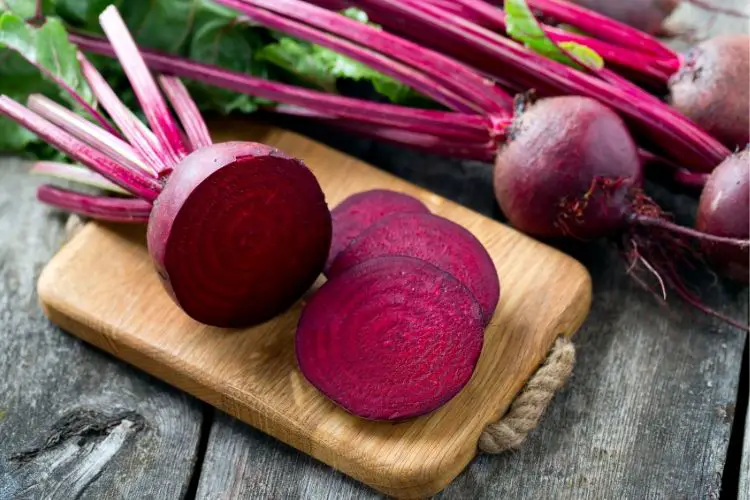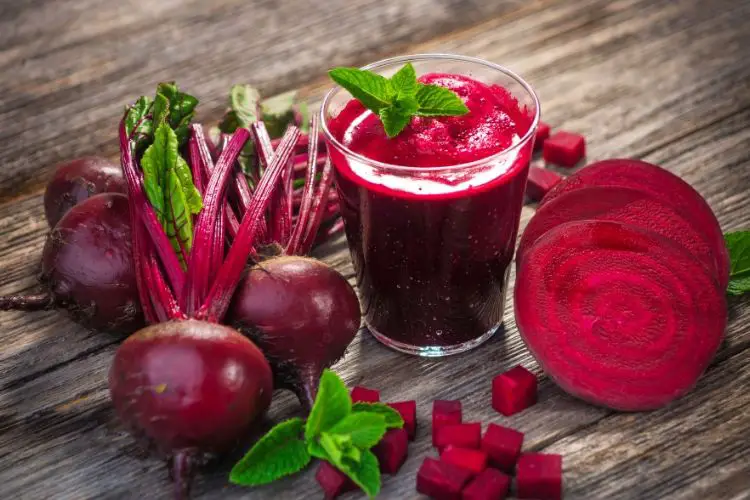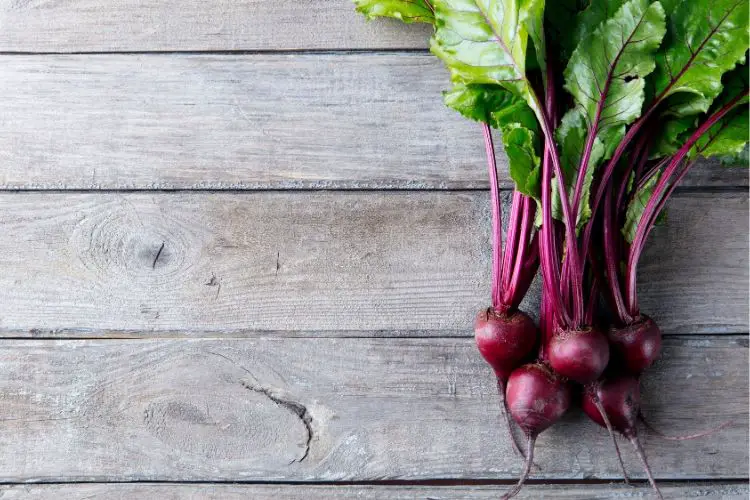
Not only are beets tasty and versatile, but their unique nutrient profile also makes them one of the world’s healthiest foods. This root vegetable’s beautiful vibrant purple/red color means it’s loaded with betalain pigments that offer amazing antioxidant benefits, which I’ll mention later in this article.
Keep reading to discover all the ways that you can enjoy this delicious root vegetable while following a low carb lifestyle…
How Many Carbs are in Beets?
- One beet (2 inches in diameter) contains 8 grams of carbs.
- One cup of chopped beets contains 13 grams of carbs.
Are Beets Keto Friendly?
Keto dieters will be pleased to know that beets contain a moderate amount of carbs. You can incorporate a few of them along with the leaves and stems (beet greens) into your dishes and still remain within your daily carb limit for Keto.
How Many Calories are in Beets?
- One beet (2 inches in diameter) contains 35 calories.
- One cup of chopped beets contains 59 calories.
Nutrition Facts
| Serving Size: 1 beet – 2″ diameter (82 grams) | |
| Calories 35 | |
| Total Fat 0.1 grams | 0% |
| Saturated fat 0 grams | 0% |
| Polyunsaturated fat 0 grams | |
| Monounsaturated fat 0 grams | |
| Cholesterol 0 milligrams | 0% |
| Sodium 64 milligrams | 2% |
| Potassium 266.5 milligrams | 7% |
| Total Carbohydrate 8 grams | 2% |
| Dietary fiber 2.3 grams | 9% |
| Sugar 6 grams | |
| Protein 1.3 grams | 2% |
| Vitamin A | 0% | Vitamin C | 6% |
| Calcium | 1% | Iron | 3% |
| Vitamin D | 0% | Vitamin B-6 | 5% |
| Cobalamin | 0% | Magnesium | 4% |
Health Benefits
Amazing Antioxidant Properties
in powerful phytonutrients called betalains. Studies show that betalains from beets provide antioxidant, anti-inflammatory, and detoxification benefits. Although other foods like Swiss chard and Rhubarb also contain betalain pigments, they have nowhere near the concentration of betalains that are naturally occurring in beets.
Prevents Obesity
Beets are great for dieters who are trying to manage their weight because they’re low in calories, almost fat-free and completely cholesterol-free.
Promotes Overall Good Health
They’re high in valuable vitamins and minerals, especially vitamin C, potassium and folate. In fact, they contain varying amounts of almost every vitamin and mineral that your body requires for optimal health.

Lowers Blood Pressure and Supports Brain Function
Beets also contain nitrates, which are known to lower blood pressure and reduce the risk of heart attacks and strokes. These nitrates also help improves blood flow to the brain, helps cognitive function and may even reduce your risk of developing dementia.
Boosts Athletic Performance
Consuming beets regularly or drinking beet juice before working out boosts energy and can your improve fitness level. Beets and beet juice improve oxygen flow through the lungs and reduce inflammation in the body.
Supports Efficient Digestion
Beets are a good source of fiber, which supports digestive health. Fiber also promotes heart health.
Anti-Cancer Properties
Studies on mice and humans infer that the pigments in beets may help impede the growth of cancer cells.
Don’t Throw Away the Beet Leaves!
When you’re preparing to cook your beets and cut off the greens, don’t throw them away! Beet stems and leaves are edible and quite delicious! They’re very similar in taste and texture to other greens like Swiss chard, spinach and bok choy.
Beet greens are delicious when steamed or boiled. Just add a pat of butter, a splash of white vinegar and season with salt and pepper. They can also be sautéed, braised, added to soups and green smoothies or eaten raw in salads.
Health Benefits of Beet Greens
Beet greens are packed with a number of essential vitamins and minerals, including iron, calcium, magnesium, zinc and fiber. They also high in protein and low in calories, fat and cholesterol.
Beet greens prevent inflammation in the body and improve digestion. They also support brain function and cognition. Additionally, the antioxidants in the purple stems offer anti-cancer properties.
Side Effects

Beet is safe for most people when consumed in regular food amounts and medicinal amounts.
Consuming beets may cause urine or stools to become pink or red in color.
If you are susceptible to oxalate-containing kidney stones, however, then beets, beet greens and beetroot powder could pose a health risk. Beets may cause of low calcium levels in the body and potentially lead to kidney damage.
Medicinal Uses
Detoxifies the Liver
Beets are commonly used to treat liver diseases like fatty liver. They are help lower levels of triglycerides in the blood and lower blood pressure.
Boosts Athletic Performance
Athletes often consume beetroot powder or beet juice to improve athletic performance and reduce muscle soreness. In fact, one study showed better stamina during high intensity exercise with human subjects who took beet juice daily over a 6 day period.
Lowers Blood Pressure
Research also indicates that drinking about 2 cups of beet juice daily lowered blood pressure in healthy adults.
Improves Sexual Health in Men
The nitric oxide in beets and beet juice can open up the blood vessels, an important benefit for men’s sexual health. Beet juice or beet root powder can be taken as a dietary supplement for men who suffer from erectile dysfunction (ED).
The male sex organ is made up of sponge-like tissue that becomes engorged with blood during an erection. There must be enough pressure in the tissue to keep the blood trapped and to maintain an erection. Nitric oxide helps sustain the pressure in the tissue of the penis that is necessary to achieve and keep an erection.
Beets also appear to affect other circulation factors of ED. High blood pressure may influence ED, as it may make it difficult for blood to flow to the penis to enable an erection.
Other Uses
- Slice roasted beets and add them in any salad. Or chop beets into cubes and toss with olive oil, balsamic vinegar, herbs, and crumbled feta cheese.
- Beet juice can be reserved and used as a natural food coloring for cakes and baked goods. Adding a little beet juice to frosting gives it a lovely pink color and is much healthier than using unhealthy food dyes.
- Add young beet greens to omelets, frittatas, pizza and pasta or use them in any dish in place of spinach.
- Bake seasoned beet greens with olive oil to make healthy chips.
- Add beets and greens to smoothies to increase nutrients and natural sweetness.
Fiber in Beets
There are 2.8 grams of dietary fiber in a 100 gram serving of cooked beets.
Sugar in Beets
A 100 gram serving of cooked beets contains 7 grams of natural sugar.
Related Questions:
How Do I Pick Good Beets?
Choose beets that are firm and heavy for their size with green tops still intact. The stems and leaves help keep the beetroot bulb fresh so that they last longer. You can also eat the leaves and stems in salads or steam the greens. Raw beets can be stored in the refrigerator for up to a week.
What’s the Best Way to Cook Beets?
First, wash the bulbs under water to remove dirt—but don’t peel the skin yet. After you bake the beets, allow them to cool and the skin rubs right off easily. Roasting them in the oven is the best method to bring out the vegetable’s natural sweetness.
To roast beets, simply cut the greens from the beet bulb. Wash the beets well and place them on a baking sheet. Add about a 1/4 inch of water to the pan and cover it with tin foil. Bake at 450 degrees for about 30 minutes or until tender. Allow your roasted beets to cool before peeling the skin. Now they’re ready to enjoy, serve them hot or cold.
Are Beets Safe for Diabetics?
Yes, beets are safe for diabetics in normal food amounts. Beets do not contain many carbohydrates and carry a medium glycemic load, falling on the glycemic index at around 61. Beets contain only 13 grams of carbs per cup. In order to spike blood sugar, you would need to eat nearly 4 whole cups of beets. More so, recent research shows eating beats regularly can even be helpful in healing nerve damage caused by diabetes.
